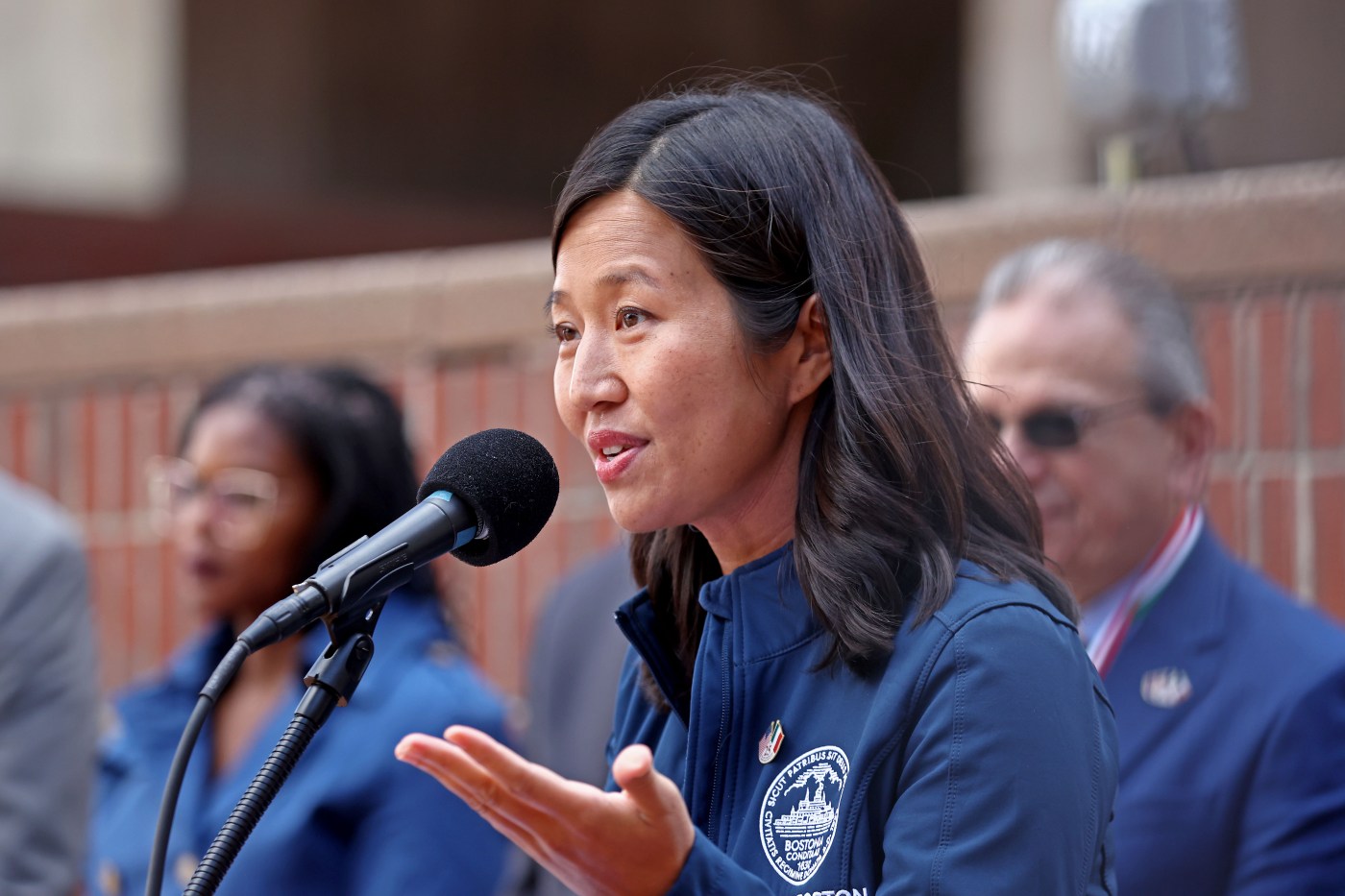
Boston Mayor Wu lobbies neighborhood leaders for support on plan to hike commercial tax rates. Not all agreed to give it.
Boston Mayor Michelle Wu pitched her plan to raise commercial tax rates to neighborhood leaders to mixed reactions at an invite-only meeting intended to convince them of the need for a bill she says would beat back a hefty tax hike for homeowners.
Wu and her financial chief presented the same new city assessment estimate data that was released a day earlier to reporters — showing that the average single-family homeowner could be hit with a 28% quarterly tax hike next year without the mayor’s proposed legislation and 9.9% with it in their January tax bills — at a late Thursday night virtual meeting with neighborhood leaders.
The mayor also delivered the same message of urgency for the Senate to act on the stalled bill by late November, to allow for the city’s proposed tax classification change to be reflected in third quarter bills that will be sent out in December.
Her pitch, while well-received by some community leaders, did not manage to convince everyone invited to take part in the 120-person-plus call.
“You’re asking us for support,” Rodney Singleton, a community leader in Roxbury, said. “There’s a lot of unanswered questions … and I think really we need a bit more information to make a decision that’s as important as this.”
Lavette Coney, another Roxbury leader, also expressed skepticism about the mayor’s tax plan while speaking to what she sees as wasteful city spending on certain positions like a “rat czar” to tackle a rodent problem she said could be handled by changing trash collection methods.
She also joined others on the call in raising questions about how much property in Boston is exempt from real estate taxes. Coney spoke to the lack of compliance from tax-exempt nonprofits and universities in making their requested payments to the city as part of Boston’s PILOT, or payment in lieu of taxes program.
“We have a little bit of a different scenario here in Roxbury, so hearing some of this is not really convincing me,” Coney said. “There are just other things that I still haven’t heard that were exhausted and tangible, not grasped, but actual pieces of information that would show me that I need to jump on your side and help others to be on your side as well.”
Speaking to comments made by some of the supportive community voices on the call, Coney said, “I don’t think that’s true, that everyone’s on board, because I still am not convinced, and I still need more information.”
Coney and Singleton, in their remarks, were partly echoing some of the criticism that’s dogged the mayor’s proposal, which is that Wu is seeking to shift more of the city’s tax burden onto businesses beyond what’s allowed by state law, at a time when the city’s budget grew by 8% in the current fiscal year 2025.
Critics have said the mayor’s administration should be looking to cut from the city budget, rather than pursue a hike in tax rates for a struggling commercial sector, but Wu’s team has called such an alternative “fiscally irresponsible.”
Cutting the budget to account for the commercial tax shortfall brought on by declining property values would “in essence” mean cutting the levy, which would require trimming about $265 million from the city’s $4.6 billion fiscal year 2025 budget, the city’s director of assessing Nicholas Ariniello said on Wednesday.
The mayor, when asked by neighborhood leaders Thursday to present both sides of the debate to help inform their decision, mentioned several of the key gripes she’s been hearing about her plan, including the latest knock that the legislation would only save the average residential taxpayer $495 a year, or $9.50 per week.
Wu also stated that a group of commercial property owners who are struggling have mentioned that it’s the “worst possible time for the tax rate to be going up” to “punish” them; business owners have privately told her that the proposal may make Boston appear to be anti-business; and others have said she has been unwilling to compromise on her plan.
“We’ve been significantly compromising,” Wu said.
The mayor mentioned the deal she struck with ally Aaron Michlewitz, a North End Democrat who chairs the House Ways and Means Committee, that resulted in her plan being approved by that chamber on the last day of formal legislative sessions in July.
Related Articles
Boston City Council weighs ranked-choice voting to overhaul local elections
Clock ticking on Boston mayor’s tax plan: Hikes as city budget grows
Boston convenes working group to plan for future healthcare access after Carney Hospital closure
Boston City Council slams USPS for ditching emergency hearing on late mail over body’s perceived ‘political agenda’
Boston Water and Sewer Commission in ‘extensive contact’ with unions pressing for suspension of embattled HR director
The House compromise tapered down the scope and length of the mayor’s initial proposal, from five to three years with a lower maximum tax shift onto commercial properties and targeted relief to small businesses, by way of an executive order Wu agreed to sign if it passes a skeptical Senate and is signed into law by the governor.
Wu’s office has stated that by shifting more of the city’s tax burden onto businesses over a three-year period, beyond what’s allowed by state law, city tax bills could be stabilized in a way that would avoid a “massive tax break” to commercial properties and a “significant” increase in residential property taxes.
“For those of us who are totally convinced by the presentation, I’m really only interested in finding out what it is that we all can do to effect the change you’ve been asking for,” Richard Giordano, a Mission Hill leader, said. “This is a political fight and it’s a PR fight and it’s a misinformation campaign.
“We, the taxpayers in the city, have been snookered,” Giordano said. “The PR campaign that has been launched is full of misinformation, and I think, unfortunately, it takes a lot more information to correct that. That’s what you did tonight.”

